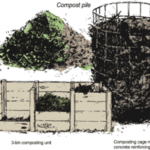By Shannon Kennedy, ANR Educator, UGA Extension Forsyth County, January 2022
Happy New Year Forsyth County! 2022 has arrived and it is the perfect time to begin planning your spring garden! Plenty of gardeners are busy mapping out their garden and choosing seed varieties, but don’t forget to give your soil a little extra care. The occasional warm day in January is perfect for preparing the soil in your garden bed, and what better way to build your soil than to add compost?
Composting has become popular in recent years for several reasons: It is an excellent way to reduce kitchen waste and when it is added to your soil it improves structure, boosts microorganism populations, and adds nutrients back into the soil.
According to the Environmental Protection Division, 12 percent of waste that goes into landfills in Georgia is organic material which could be composted. When these materials are thrown away, they fill the landfill faster and produce methane gas, a major greenhouse gas. Composting kitchen scraps along with yard waste reduces the negative impact on our landfills and produces a wonderful garden amendment.
Since compost is the result of plant decomposition, it contains nutrients like nitrogen, potassium, and phosphorous which are essential to plant health. Compost will release these nutrients slowly over time, which can be beneficial to maintaining long-term fertility in soil. Compost will also improve the structure of the soil for improved water infiltration and aeration, both of which benefit plant health.
Microorganisms are responsible for the decomposition process that breaks plant material down from complex molecules into smaller parts. These beneficial microorganisms remain in the mature compost, so adding compost to your garden improves the beneficial bioactivity of the soil. The microorganisms continue to break down fallen leaves and old mulch in your garden, thus releasing nutrients.
If you are looking to start a compost pile in your back yard, there are two methods you could use: cold composting or hot composting. Cold composting is the lowest input method, and it requires the least amount of attention. Simply pile up your compost materials as they become available and let the pile sit to decompose. This process works best if you do not create a lot of kitchen scraps, but it is a slow process taking many months to complete.

If you are interested in learning more about the how to compost, keep an eye on Forsyth County Extension’s calendar. In April and May, we will be offering Georgia Green Landscape Stewards classes that will cover topics such as composting, native and invasive plants, water quality issues, and other sustainable landscape topics. Updates for our events are posted on our Facebook page and our website.